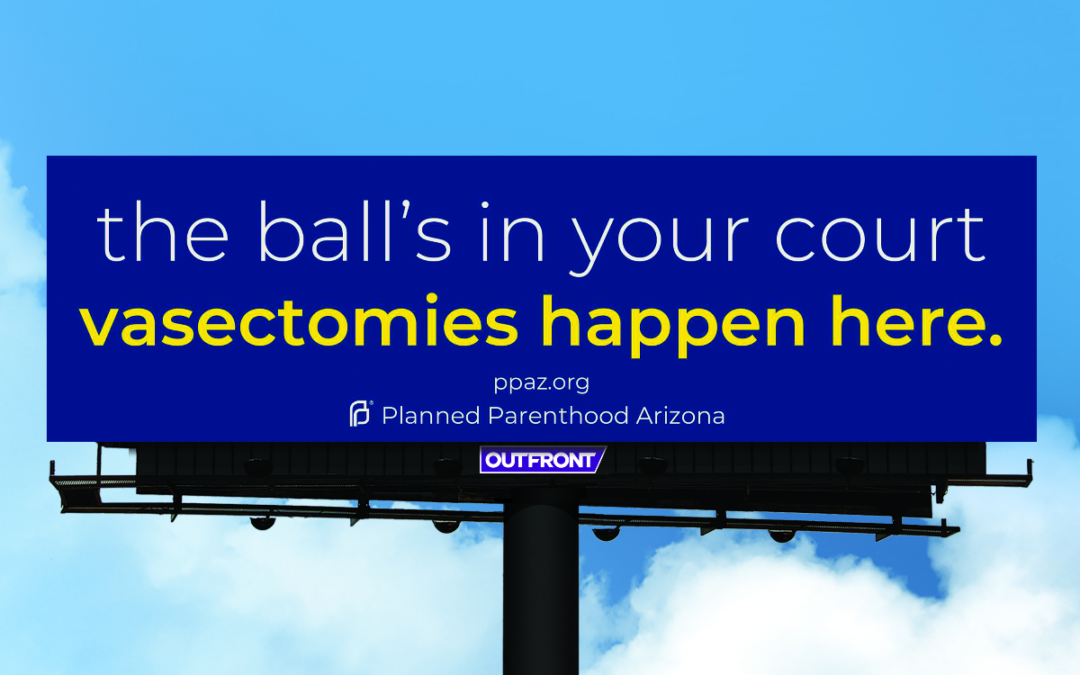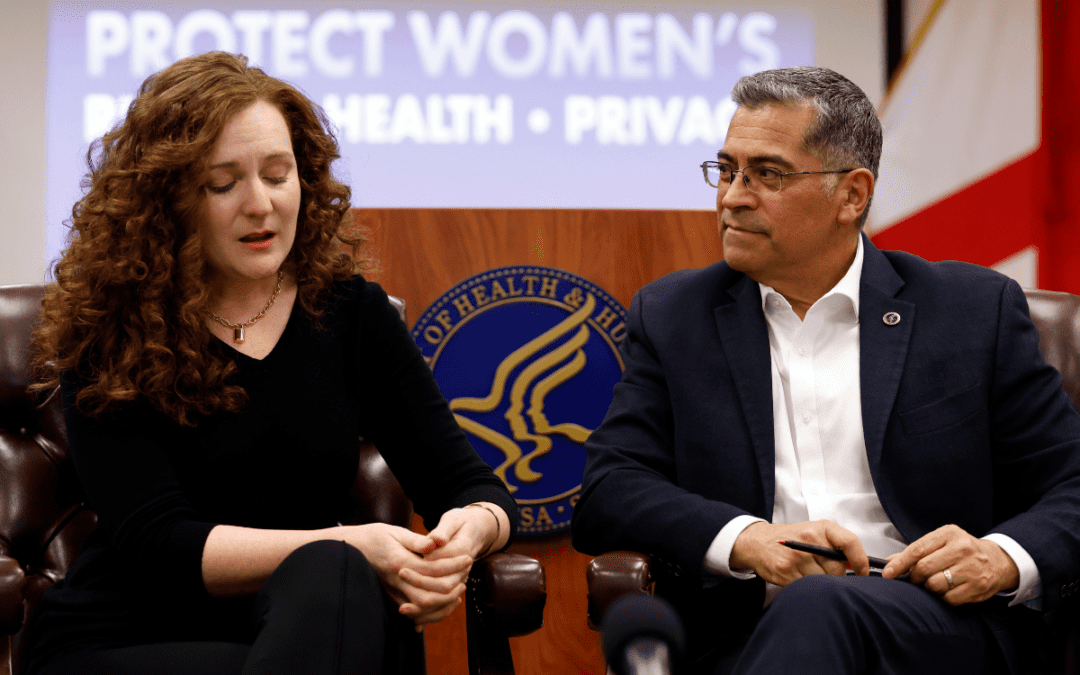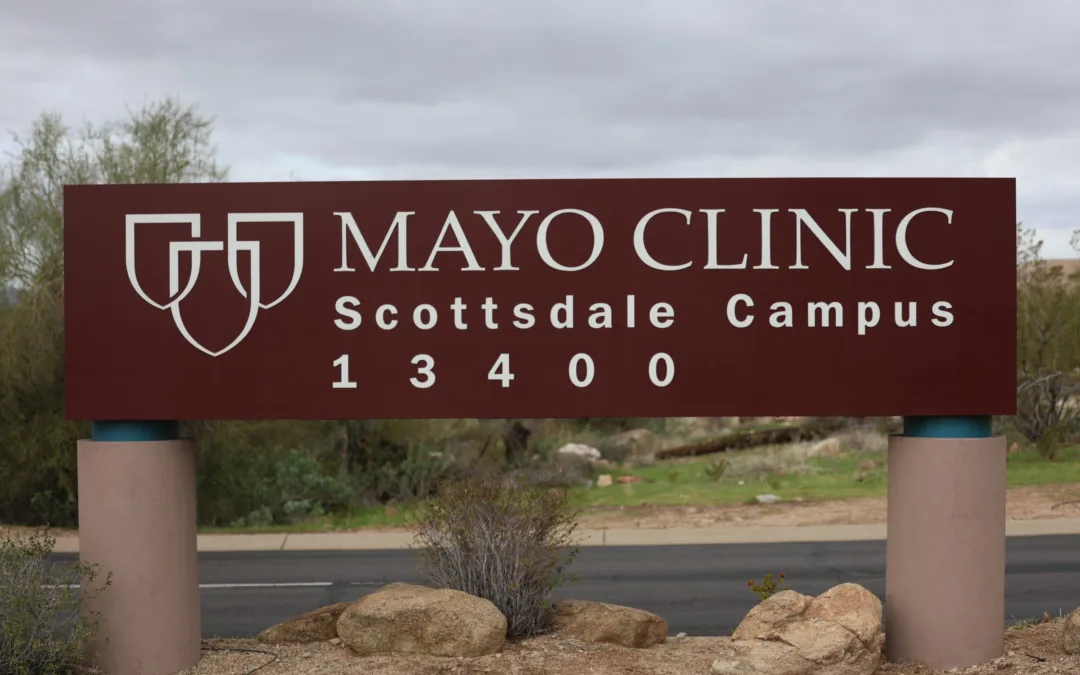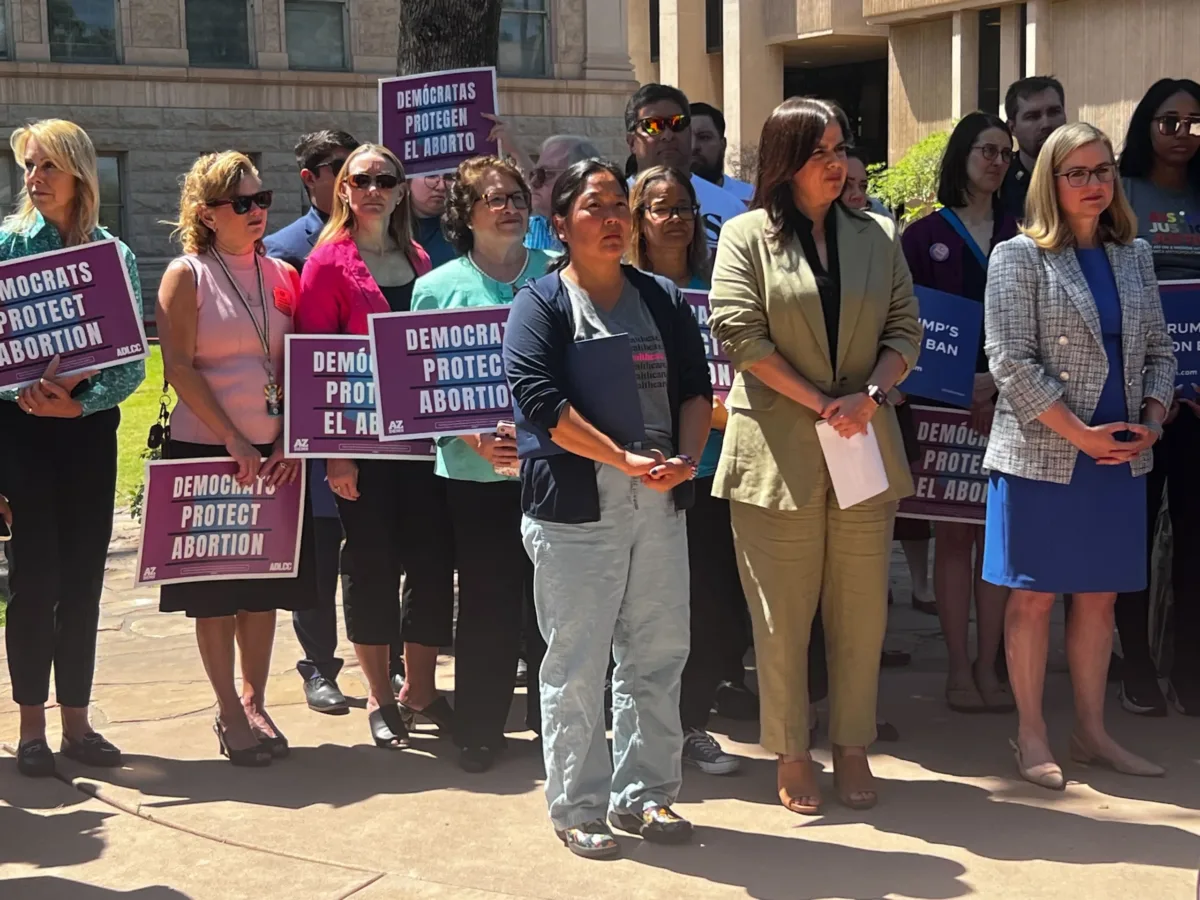
(Left to right) Dr. Atsuko Koyama, Arizona Democrats Chair Yolanda Bejarano, and Phoenix Mayor Kate Gallego stand at a press conference outside the Arizona Capitol on April 9, 2024. (Photo by Robert Gundran)
“I hope that we’re talking to our friends and family and neighbors…and helping them get registered and get to the ballot, because that I think is what’s going to save us or sink us.”
Dr. Atsuko Koyama is operating as usual following the April 9 Arizona Supreme Court ruling, which turned back the clock to 1864 for abortion laws in the state. But the physician knows time is just about up on the abortion care she provides.
Koyama has practiced medicine at Camelback Family Planning in Phoenix since 2020. She was there when Roe v. Wade was overturned in 2022, marking the first step toward an unclear future for abortion in Arizona. Since then, Arizona has been a battleground for reproductive freedom.
“We’re angry, right?” Koyama said. “And we’re tired, very tired. This is a fight that has been happening for years and it has been in the making.”
Jamie Gluntz, a registered nurse at Camelback Family Planning, said the ruling was devastating—but also served as a rallying cry.
“We are going to come back with even better protections for abortion care, so that this never happens again,” Gluntz said.
Arizona’s abortion timeline
When the US Supreme Court ruled on the Dobbs v. Jackson case in June 2022, their decision reversed the 1973 Roe v. Wade ruling, which classified the right to abortion as “fundamental” at a federal level. States could restrict abortions to some extent, but pregnant women in America ultimately had the power of the US judicial system behind them.
Here in Arizona, Roe v. Wade had replaced a near-total abortion ban set in 1864, 48 years before we even became a state. In February 2022—a few months before the Dobbs decision was released—word got out that the Supreme Court planned to overturn Roe.
In March of that year, then-Gov. Doug Ducey—a Republican—signed a law banning abortion in Arizona after 15 weeks that explicitly stated it did not repeal the 1864 law. So when Dobbs eventually overturned Roe in June, Arizona courts found themselves facing challenges to the 15-week ban by conservatives hoping to go back to the pre-Roe ruling.
READ MORE: This Tempe woman is fighting to get abortion on the ballot this year
An injunction—a particular kind of court order—was in place, blocking the 1864 ban. But Arizona Attorney General Mark Brnovich, also a Republican, “persuaded a state judge” to lift the injunction, according to AP reporting. When his successor, Democrat Kris Mayes, was sworn in, a state Court of Appeals then suspended the law. It’s been, in short, a confusing mess.
Enter: the Arizona Supreme Court. Back in the Ducey days, the Republican governor expanded the state Supreme Court from five to seven justices. All were appointed by Republican governors, and all are known conservatives.
Their ruling on April 9, 2024, determined the 1864 total ban was the law.
“In light of this opinion, physicians are now on notice that all abortions, except those necessary to save a woman’s life, are illegal,” the court wrote in its ruling.
That means any abortion at any time in any pregnancy—even those that happened as a result of rape or incest, to a person of any age—are illegal. The law carries a sentence of two to five years in prison for anyone who provides an abortion.
What’s more, additional criminal repercussions may apply to abortions performed after 15 weeks of pregnancy, according tot the court ruling. The only exception is in a case where it would save the life of the pregnant woman—forcing physicians to walk a line between just how close to death a woman must get before they can provide an abortion without going to prison.
The law, ARS 13-3603, reads:
“A person who provides, supplies or administers to a pregnant woman, or procures such woman to take any medicine, drugs or substance, or uses or employs any instrument or other means whatever, with intent thereby to procure the miscarriage of such woman, unless it is necessary to save her life, shall be punished by imprisonment in the state prison for not less than two years nor more than five years.“
Koyama said her frustration comes from the fact that abortion is a standard form of reproductive health care, used both to end unwanted pregnancies and pregnancies in which the fetus has an illness or injury that is incompatible with life. Furthermore, she noted, most Americans support legalized abortion.
This is true. Since the 1970s, a majority of Americans have said abortion should be legal in some form, according to repeated polling from Gallup.
“One-in-four [women] in this country have had an abortion,” Koyama said. “Abortion is common and it’s something that is needed for a variety of reasons. But the taboo makes it so no one wants to talk about it. And then it has this heaviness and guilt to it … that they don’t want to talk about it.”
RELATED: Looking for telehealth abortion care in AZ? The state says ‘No.’
“This is a normal doctor’s appointment, and that’s how it should be viewed,” said Gluntz, the nurse at Camelback Family Planning. “It hurts me that other people are so worked up about someone’s right to choose.”
Business as usual (for now)
Camelback Family Planning in Phoenix was still open for appointments as of April 10, just one day after the Arizona Supreme Court ruling.
In the ruling, the court said enforcement would not start until 14 days after it delivered its ruling. That date was tentatively set at April 23, though former Arizona Attorney General Mark Brnovich agreed to not enforce the 1864 law until 45 days after the case was resolved—leaving the exact date the law will go into effect not immediately clear.
Arizona Attorney General Kris Mayes said no matter when the ban goes into effect, she will not prosecute under the 1864 law.
“Let me be completely clear. As long as I am Attorney General of the state of Arizona, no woman or doctor will be prosecuted under this draconian law,” Mayes said at a press conference after the court rendered its decision.
In most counties across the country, local prosecutors—not state attorneys general—hold the power to make those decisions. But last year, Gov. Katie Hobbs—a Democrat—granted Mayes authority to make all abortion-related prosecutions in the state.
Despite that assurance, Koyama said she would not break the law.
“I will speak for myself, and myself only,” Koyama said. “I will always practice medicine as per the laws of the state I’m practicing in.”
She added that the 1864 law includes language that isn’t clear—particularly for the modern era.
“There’s no further clarification, which I’m not arguing for. I think that’s also dangerous to say ‘Oh, [at-risk of death is] when the blood pressure is this and this,’ and that’s asinine because that’s not the way medicine works,” she said. “It’s not the way the human body works. We need to have leeway.”
Even with the exception for the women’s life, the law’s existence puts a chilling effect on doctors. A Texas woman almost died after her water broke just four months into her pregnancy, under a similar ban.
“[The law] threatens people’s lives,” Koyama said.
Republicans scrambling to keep voters
Given the polling on abortion, some Arizona Republicans released statements after the court’s ruling claiming they believed the court went too far. However, as of publication on April 12, the Republican-controlled Arizona Legislature had not voted to repeal the 1864 law.
Rep. Stephanie Stahl-Hamilton, a Presbyterian minister and Democrat, introduced such a bill in January, but it did not receive a hearing on any committee.
“Republicans here in Arizona are complicit,” Stahl-Hamilton said at a press conference. “They are complicit in this ban…They don’t plan to stop until our rights are gone.”
Koyama said she supports a full repeal of the 1864 law.
“I’m not a politician, I’m a physician just trying to provide care,” she said. “I don’t know exactly the steps one would have to take, but if before November—even before the ballot measure—if all these people got together and said, ‘Let’s just get this done now….’”
She’s referencing a ballot measure that volunteers are collecting signatures for now. If they get enough valid signatures, a ballot measure will be placed on the November ballot asking Arizonans to vote on whether the right to an abortion should be protected in the state’s constitution.
“I just hope everyone holds their elected officials accountable,” Koyama said. “I hope [people] look at [politicians’] past records to see if this is someone they can trust and want to continue to vote into office.”
Despite Arizonans of reproductive age, along with healthcare providers, now facing a total abortion ban, the ballot measure is offering a small ray of hope.
“If we can get abortion in the constitution in November, we’ll never have to worry about any of this,” Gluntz said. “We are hopeful. We need something better than Roe v. Wade. We need something that gives even more protections. Something that gives even more access.”
Politics
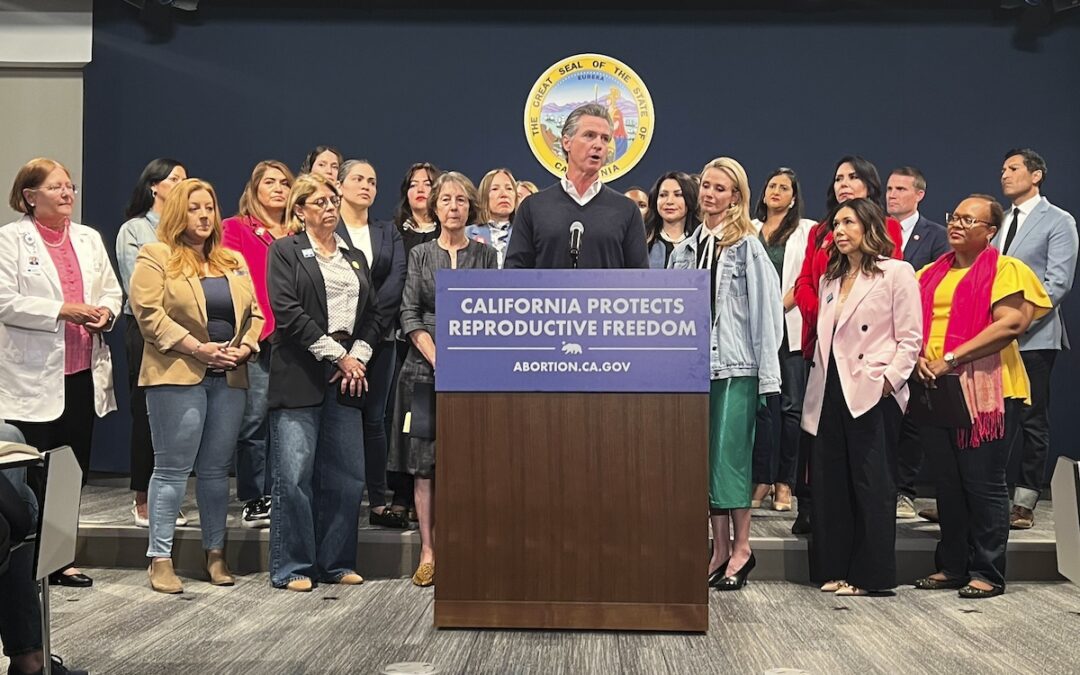
Gov. Gavin Newsom wants to let Arizona doctors provide abortions in California
California law generally allows abortion up to the point of fetal viability, which is around 24 weeks. SACRAMENTO, Calif. (AP) — Arizona doctors...

VIDEO: Arizona Attorney General Kris Mayes indicts 18 ‘fake electors’
@coppercourier An Arizona grand jury has indicted former President Donald Trump's chief of staff, Mark Meadows, lawyer Rudy Giuliani, and 16...
Local News

Escape the heat at these indoor pools in Tucson
Arizona: it's synonymous with sunny. Mix that sun with the sprawling urban blacktops and the result is the nationally recognized heat that is...

We asked, you answered: 7 music venues in Arizona for a more intimate show
The biggest artists in the world come to Arizona to perform at places like Footprint Center, State Farm Stadium, and Desert Diamond Arena. But what...




